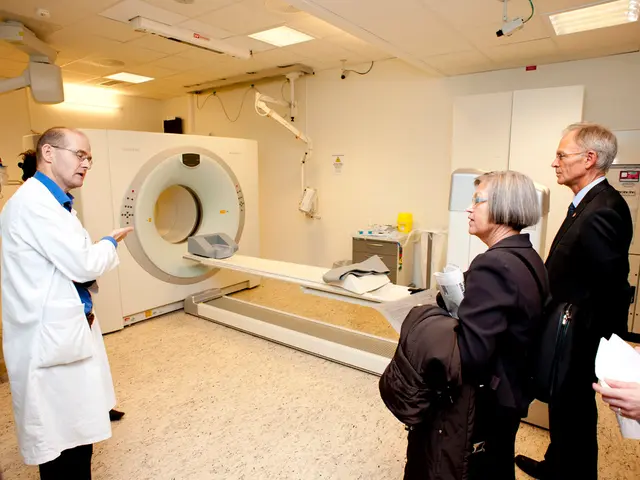Strategies for managing C3 Glomerulopathy (C3G) disease
Hey there!
Let's dive into understanding C3 Glomerulopathy (C3G), a rare kidney condition that impacts approximately 2-3 folks per million. This condition forms protein deposits in the kidney's filtering tissues over time, hindering their function and potentially leading to kidney failure.
As of now, there's no cure for C3G. Treatment starts with strategies to maintain healthy kidney function. Doctors often recommend systemic treatments to suppress the immune system, especially when kidney function declines. New and innovative treatments for C3G are targeting proteins that contribute to disease activity.
Now, what leads to C3G? An overactive portion of the body's immune system triggers it, with certain genes causing the imbalance in proteins that control the complement system. This critical part of the immune system needs these proteins in balance to work effectively. Altered genes lead to C3G, causing some proteins to be active more often than they should be.
As a result, the body produces excessive C3 protein which forms deposits in the kidney, affecting the glomeruli—the blood vessels located in the kidneys responsible for filtering waste and excess fluid. The continuous buildup of C3 results in progressive damage to the glomeruli, impairing the kidneys' ability to filter toxins out of the blood.
Besides genetic changes, people with C3G often carry antibodies impairing the complement system's normal function. Research suggests genetic links between family members with the condition, although these genetic alterations in C3G are not believed to be strictly inherited.
Currently, treatments for C3G can't reverse or halt the condition. Instead, the goal is to slow kidney damage down.
The Kidney Disease: Improving Global Outcomes (KDIGO) organization offers clinical guidelines for managing C3G. These guidelines recommend supportive interventions to help slow and prevent kidney damage. As kidney function worsens, the guidelines suggest immunosuppressive therapies.
When it comes to medications, ACE inhibitors and ARBs, which lower blood pressure and prevent proteinuria, are often used. Mycophenolate mofetil (MMF) and glucocorticoids, both immune-suppressing drugs, are also recommended once kidney function has declined for at least six months, or if there are other signs of the condition's progression.
Complement inhibitors are another treatment option to slow down kidney damage. These medications suppress complement system activity, potentially stopping the progression of C3G. Eculizumab and ravulizumab are monoclonal antibodies that block the terminal pathway of the complement system, with eculizumab showing mixed results.
Diet plays a crucial role in supporting the kidneys with C3G. A diet that reduces sodium, potassium, and phosphorus, balances protein and healthy fats, and maintains an equilibrium between fluid intake can help lighten the burden on the kidneys. Collaborating with a dietitian to create a tailored diet plan can ensure adequate nutrition while supporting the kidneys.
Researchers are hard at work developing new treatments for C3G that address the underlying cause of this condition by interfering with complement system activity at various points. Some experimental treatments in different stages of clinical trials include:
- Pegcetacoplan: Targets C3, currently under Priority Review by the FDA for C3G treatment.
- ARO-C3: Also targets C3, with ongoing clinical trials.
- Iptacopan: Inhibits the alternative complement pathway by targeting factor B, recently FDA-approved for C3G.
- Danicopan: Targets factor D, part of the complement system.
- Avacopan: Targets C5a, a component of the complement system.
- KP104: Targets both C3 and C5, aiming to widely interfere with complement system activity.
- Narsoplimab: Targets MASP-2, involved in the lectin pathway of the complement system.
These emerging treatments offer hope for improved management and prevention of kidney damage in C3G patients. Stay tuned for updates as research progresses!
Hey there! Let's explore C3 Glomerulopathy (C3G) further, as it's a lesser-known chronic kidney disease that affects about 2-3 people per million. This condition involves protein deposits in kidney tissues due to the body's overactive immune system and altered genes.
The onset of C3G may lead to impaired kidney function and, potentially, kidney failure. As there's no cure, treatment primarily focuses on maintaining kidney health through systemic therapies that suppress the immune system. Research is currently targeting proteins contributing to disease activity for new and innovative treatments.
Besides genetic factors, people with C3G often carry antibodies affecting the immune system's normal function. Though family members may share genetic links, these alterations aren't thought to be strictly inherited.
The Kidney Disease: Improving Global Outcomes (KDIGO) offers guidelines for managing C3G, recommending supportive interventions to slow and prevent kidney damage. As kidney function worsens, immunosuppressive therapies may be suggested.
Medications such as ACE inhibitors, ARBs, MMF, and glucocorticoids are used to lower blood pressure, prevent proteinuria, and manage the condition's progression. Complement inhibitors, like eculizumab and ravulizumab, are also options for slowing kidney damage.
Maintaining a healthy diet is crucial for supporting kidneys with C3G, focusing on a low-sodium, low-potassium, low-phosphorus plan while balancing proteins, healthy fats, and fluids. Consulting with a dietitian can help customize a diet plan to provide necessary nutrition and support the kidneys.
Innovative treatments for C3G target the immune system impairments that cause the condition. Experimental treatments like Pegcetacoplan, ARO-C3, Iptacopan, Danicopan, Avacopan, KP104, and Narsoplimab aim to interfere with the complement system at various stages for better management and prevention of kidney damage in C3G patients. Stay informed for further updates on these promising therapies!
This discussion touches upon C3G, but it's essential to be mindful of other medical conditions, including diabetes, heart disease, cancer, respiratory conditions, digestive health, eye health, hearing, mental health, men's health, women's health, autoimmune disorders, skin conditions, neurological disorders, and others. Paying attention to your overall health and wellness is necessary for maintaining fitness and exercise, sexual health, and proper nutrition throughout various stages of life, including aging and parenting.
Remember, it's crucial to work on incorporating wellness initiatives, such as weight management, cardiovascular health, and stress management, into your everyday life. Seek out medical advice and treatment when necessary, and always prioritize self-care to live a healthier, happier life.








